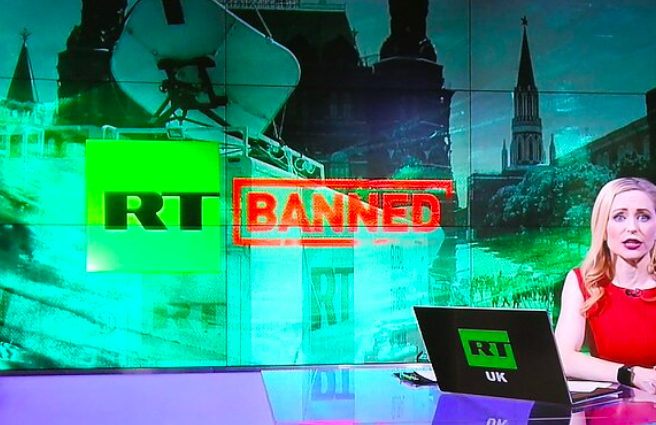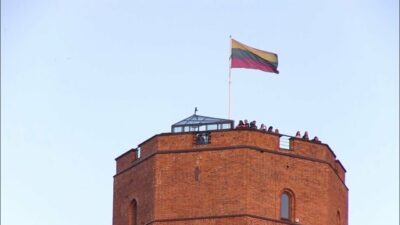Lithuania’s decision to block RT, a Kremlin-controlled media group formerly known as Russia Today, has been called out by Russian officials as an “unfriendly” decision,…

Lithuania’s decision to block RT, a Kremlin-controlled media group formerly known as Russia Today, has been called out by Russian officials as an “unfriendly” decision, but also a misapplication of EU sanctions. LRT FACTS investigate.
The decision to block RT “was based on EU ‘personal sanctions’ against Rossiya Segodnya Director General Dmitry Kiselyov, who has nothing to do with the Russia Today media holding, as we have repeatedly reminded all those concerned,” Maria Zakharova, the spoekswoman for the Russian Foreign Ministry, told reporters on July 9. But is it really so?
Russian officials claim Lithuania is confusing names
RT is an international programming channel based in Moscow, mostly focusing on international audiences. RT belongs to Russia’s ANO TV-Novosti, which is headed by Alexey Nikolov.
However, a completely different company which is often confused with RT is also based in Moscow, and has the same name, only written in Russian – Rossiya Segonya, or, Russia Today. Dmitry Kiselyov, who heads this media group, is under EU sanctions for his role in promoting Russia’s annexation of Crimea in 2014.
The sanctions include people and organisations which Brussels says have been undermining Ukraine’s territorial integrity, sovereignty, and independence. Therefore, EU member states have agreed to freeze assets of these organisations and people, and also bar them from entering the bloc.
The names of the two companies, RT and Rossiya Segodnya, mean the same thing and many critics have pointed at this fact as the source of alleged confusion. Despite heading Rossiya Segodnya, Kiselyov is not named as the head of RT.
“This is direct pressure on the media, an open act of censorship,” Timur Shafir, vice president of the Russian Union of Journalists, was quoted by Sputniknews.lt, the Kremlin’s other outlet operating in the Baltic states.
“The basis for this decision causes concern, because people are likely confusing Rossiya Segodnya with RT and RussiaToday by [claiming] Kiselyov is responsible for RT,” he said.
Margarita Simonyan, editor-in-chief of RT, echoed the same views.
“Dmitry Kiselev has nothing to do with Russia Today. Dmitry Kiselev heads the Russia Today [Rossiya Segodnya] news agency, even if Google translate tells you that Russia Today [Rossiya Segodnya] translates to Russia Today [RT],” she posted on Telegram.
RT‘s Soviet roots
However, it’s not difficult to trace Kiselyov’s connection with RT. According to Latvia’s media watchdog, TV Novosti which allegedly isn’t connected with Kiselyov, has been established by RIA Novosti.
It was established in 1941 by Sovinformburo, a major Soviet news agency, and operated until 2014. Russian President Vladimir Putin had ordered the company to be liquidated, creating Rossiya Segodnya in its place. Under the decree signed by Putin, TV Novosti, that includes RT, would transfer all rights to Rossiya Segodnya. In this chain, RT is connected via TV Novosti and Rossiya Segodnya with Kiselyov.
In the EU sanctions document, Kiselyov is named as a “central figure of the [Russian] government propaganda supporting the deployment of Russian forces in Ukraine,” because he was “appointed by [a Russian] presidential decree on December 9, 2013, head of […] Rossiya Segodnya”.
EU sanctions typically target Russian businesspeople by hitting their financial transactions and operations. For example, Estonian authorities traced employees of Sputnik – another company connected with Rossya Segodnya – and warned about impending criminal liability if they don’t cancel their work contracts. Bank accounts of one company registered in Estonia were also frozen.
However, no legal entity connected with RT operates in Lithuania, so the country’s media watchdog, the Lithuanian Radio and Television Commission (LRTK), had taken the decision to ban television providers from broadcasting RT channels and generating revenue from RT broadcasts.
Mantas Martišius, the head of LRTK, said claims by the Russian Foreign Ministry and other critics were missing the full picture.
According to Martišius, even though the connection between RT and Kiselyov is indirect, Kiselyov‘s receives revenues from RT broadcasts in Lithuania.
“The essence of sanctions is that [they are targetted at] a businessperson, or a politician who has business interests, who takes part in implementing political goals,” he said. “These people are added to the sanctions list in order to limit conditions for their business.”
Martišius said he hoped other EU member states would follow suite, echoing similar sentiments of his Latvian counterparts.
Kiselyov’s symbolic weight
Mikhail Maglov, a Russian journalist living in Lithuania, said Kiseloyv had a formal, legal, and symbolic weight in the country’s media landscape. The Kremlin has taken advantage of Kiselyov’s influence, especially after the pro-European Maidan revolution in Ukraine, according to Maglov.
“Dmitry Kiselyov lived and worked in Ukraine for a long time, he knew a lot of influential people,” Maglov told LRT.lt. “Therefore, during Euromaidan in 2013, he became a highly influential leader of Russia’s propaganda.”
Because of his influence, Kiselyov became the host of the hugely popular weekly show on Rossiya-1 channel. Later, he was appointed as the head of Rossiya Segodnya.
Manipulation / propaganda. Although Dmitry Kiselyov isn‘t directly connected to RT channels banned in Latvia and Lithuania, he heads a national media group which has the legal rights to RT.




